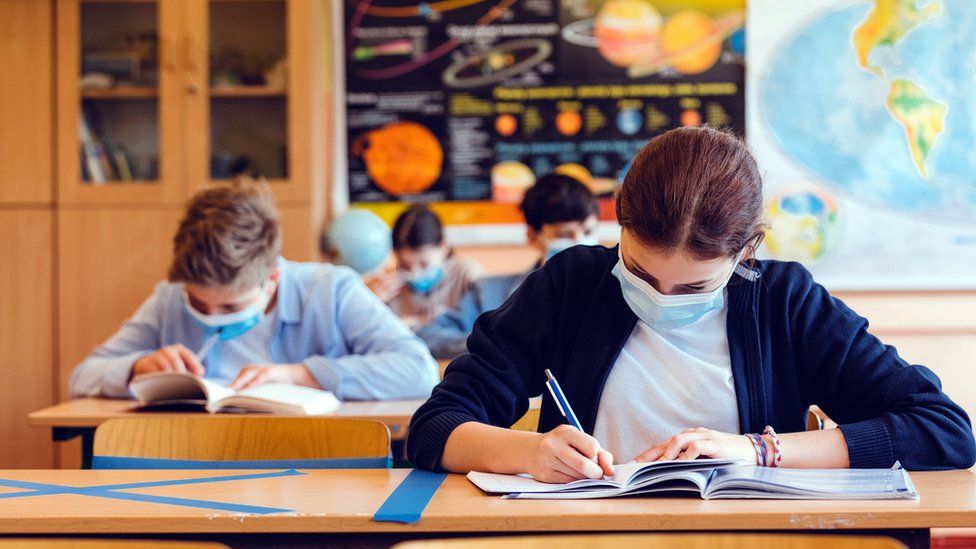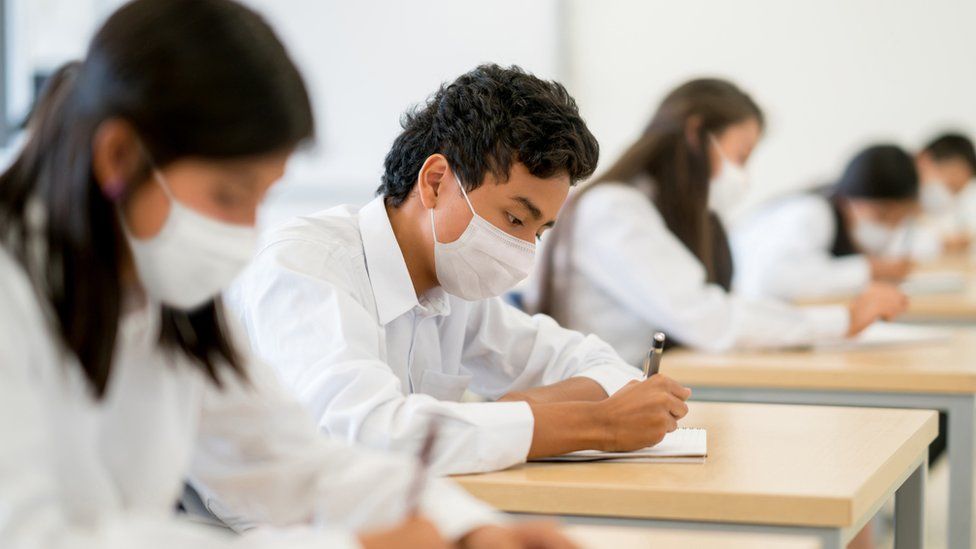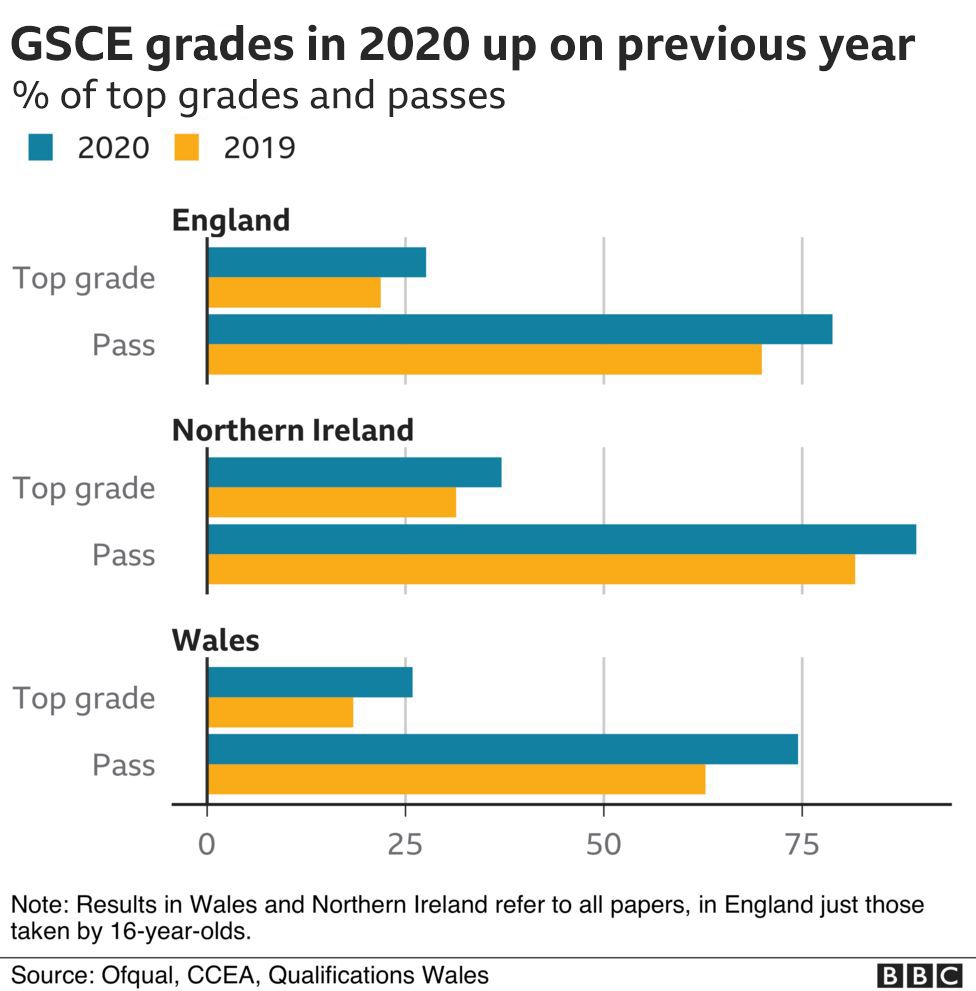
Hundreds of thousands of pupils are finding out their GCSE results, amid predictions of another spike in grades after exams were cancelled.
Pupils will receive their grades in England, Wales and Northern Ireland, in a second year of exams disrupted by the pandemic.
It follows a leap in top grades at A-level earlier this week – and record rises last year for GCSEs.
The replacement systems this year have used teachers’ judgements for grading.
Labour leader Sir Keir Starmer called on Prime Minister Boris Johnson to sack Education Secretary Gavin Williamson following Tuesday’s A-level results, which prompted warnings over the gap between state and private school pupils.
Sir Keir told the Guardian he thought Mr Williamson should have been dismissed “a long time ago. And I don’t think I’m alone”.
Mr Williamson said students should “feel proud of their achievements” and paid tribute to teachers and school leaders.
GCSE pupils were assessed this year using mini-exams, mock exams, homework or coursework.
There were multiple chances for pupils to show their greatest potential, exam officials said.
And they said no-one will have lost out from having a bad day in an exam.
Exam watchdog Ofqual said the system is fair, each centre had its assessment policy reviewed and many samples of GCSE work were checked during a “quality assurance” process.
But teacher-assessed grades are likely to be higher on average.
Of last year’s GCSE entries:
- 26.2% were awarded a top grade (7-9 or A-A*) – up from 20.8% in 2019
- 76.3% were awarded a grade C/4 or above – up from 67.3%
And Prof Alan Smithers, of the Centre of Education and Employment Research, at Buckingham University, said it would be difficult for the government to reverse this trend over the coming years – as the higher grades are so popular with parents and schools.
“It will be quite a task for the government to put the genie back into the bottle,” he said.
Prof Smithers also predicted this year would see girls continuing to achieve much higher GCSE grades than boys.
And there have been warnings about social inequalities being made worse by the pandemic, with differences in:
- access to computer equipment
- parental support
- space for studying at home
England’s former education-recovery commissioner Sir Kevan Collins has said such social divides could mean widening gaps in A-level and GCSE results, including between different parts of the country.
But head teachers say the replacement grades used this year will allow pupils to progress to the next stage of their education.

National Association of Head Teachers leader Paul Whiteman said talk of “grade inflation” was unhelpful as the way results have been determined meant they were not comparable with previous years.
“In a normal year, we would see the process of comparable outcomes ranking students from top to bottom, meaning that broadly the same proportions of students received each grade,” he said.
“This year, students have been able to show what they know, understand and can do, without the high-pressure snapshot moment of an exam, where some students will always underperform.”
Geoff Barton, of the Association of School and College Leaders, said: “It is important to focus on the achievements of this cohort rather than fixate on comparisons with other years, which are somewhat meaningless.”


‘It has been a rollercoaster’
Roman, is calm and confident about achieving the grades he needs.
But the pupil at Sydney Russell School, in Dagenham, Essex, says the challenges he has faced over the past two years have had a real impact.
“It has been a rollercoaster – so many ups and downs, and so many battles, both mental battles and physical ones,” he says.
Roman would have preferred to sit exams, which he feels would have been easier than the constant pressure of lots of tests.
However, he says: “I feel like the teachers have done a good job in explaining what was needed – and that helped with the pressure.”
Syeda, also from Dagenham, is hoping for some high grades among the nine GCSEs she took.
“It has been a bit crazy for everyone involved in this process this year,” she says.
“For the past five years, we’ve expected we were going to sit our exams in June 2021 – but the fact is that we have been disrupted by 18 months of this pandemic.”
And although the end-of-course exams were cancelled, Syeda still had to sit 62 assessments.

“I don’t think anyone could have ever imagined stuff like this,” she says
“But the fact is that we have got through it – and hopefully our results tomorrow will prove that we have worked hard.”
To those people who criticise the value of this year’s grades, Syeda says: “I would tell them they should try and be in our place, where we are sitting 60 exams, and see how difficult it actually is.
“I don’t think anyone can know what it is like unless you are experiencing it yourself.”
She is aiming to sit A-levels next year and study English literature at the University of Cambridge.

There are different devolved systems for GCSEs, with:
- English exam boards using a numeric 1-9 for grades
- the Welsh remaining on the alphabetic grading system
- pupils in Northern Ireland taking a combination of both

